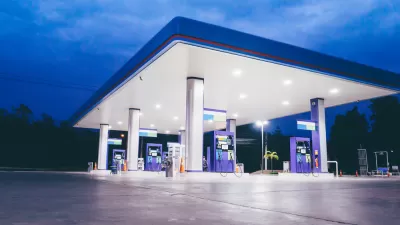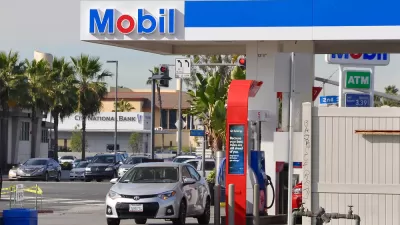While there may never be a good time to increase the federal gas tax, the same is not true when it comes to state gas taxes—perhaps because governors can't transfer billions of dollars from general funds to pay for roads. Lower gas prices helps.
What's happening on a state level could not be more different than what's happening inside the Beltway in terms of transportation funding. And it's not a partisan issue, as we've noted here on several occasions, beginning with Wyoming last year.
"Several states are tired of waiting for Congress to fix the federal highway trust fund, so they're considering raising gas taxes themselves to address their crumbling roads," writes NPR reporter David Schaper.
According to Carl Davis, a senior analyst with the nonprofit Institute on Taxation and Economic Policy (ITEP), "gas tax increases are now on the table in states across the country, from New Jersey to Utah to South Carolina to South Dakota," writes Schaper about states with Republican governors. "Democratic governors in Delaware, Vermont and Kentucky, and other states are also looking to possibly raise gas taxes, as has been done in Pennsylvania, Maryland, New Hampshire and Wyoming in the last two years."
"There have been overwhelming infrastructure needs for quite awhile and now that gas prices are lower, it's a little bit more politically feasible to talk about raising the gas tax," [Davis] says.
Schaper's focus is on the Republican governor of Michigan, Rick Snyder, who "is calling on lawmakers to roughly double Michigan's gas tax over time, to raise more than $1 billion." His goal: "get us to fair to good roads."
"There have been overwhelming infrastructure needs for quite awhile and now that gas prices are lower, it's a little bit more politically feasible to talk about raising the gas tax," he says.
We reported on Snyder's gas tax proposal last month which would replace the 19-cents excise tax with a "wholesale fuel sales tax, resulting in an anticipated $1.2 billion annual revenue increase."
Snyder is one of a growing number of Republicans across the country who see the need to spend big to improve infrastructure, and who are looking to increase gas taxes to pay for it.
Davis opines that with the plummeting price of gas, "(t)here's kind of been a switch that's been flipped." Sadly, no such switch exists in Congress or the White House.
ITEP's 2011 white paper, "'Building a Better Gas Tax,' offers three specific policy recommendations for modernizing -- and increasing -- state gasoline taxes," writes Driving Today's contributing editor, Tom Ripley.
- Increase gas tax rates to reverse their long-term declines; the “appropriate rate” of increase desired varies by state.
- Peg gas tax to grow alongside the cost of transportation construction projects.
- Create or enhance targeted tax credits for low-income families to offset the impact of gas tax increases.
However, #2 proved elusive on Nov. 4 in the Bay State, when voters rejected the gas tax indexing that the legislature had approved last year. Consequently, at least one Massachusetts rail project may be "on the chopping block."
[Hat tip to Bill Magavern of Coalition for Clean Air].
FULL STORY: GOP Leaders: Gas Tax Hike Could Fuel Fixes To Bad Roads And Bridges

Planetizen Federal Action Tracker
A weekly monitor of how Trump’s orders and actions are impacting planners and planning in America.

Chicago’s Ghost Rails
Just beneath the surface of the modern city lie the remnants of its expansive early 20th-century streetcar system.

San Antonio and Austin are Fusing Into one Massive Megaregion
The region spanning the two central Texas cities is growing fast, posing challenges for local infrastructure and water supplies.

Since Zion's Shuttles Went Electric “The Smog is Gone”
Visitors to Zion National Park can enjoy the canyon via the nation’s first fully electric park shuttle system.

Trump Distributing DOT Safety Funds at 1/10 Rate of Biden
Funds for Safe Streets and other transportation safety and equity programs are being held up by administrative reviews and conflicts with the Trump administration’s priorities.

German Cities Subsidize Taxis for Women Amid Wave of Violence
Free or low-cost taxi rides can help women navigate cities more safely, but critics say the programs don't address the root causes of violence against women.
Urban Design for Planners 1: Software Tools
This six-course series explores essential urban design concepts using open source software and equips planners with the tools they need to participate fully in the urban design process.
Planning for Universal Design
Learn the tools for implementing Universal Design in planning regulations.
planning NEXT
Appalachian Highlands Housing Partners
Mpact (founded as Rail~Volution)
City of Camden Redevelopment Agency
City of Astoria
City of Portland
City of Laramie





























